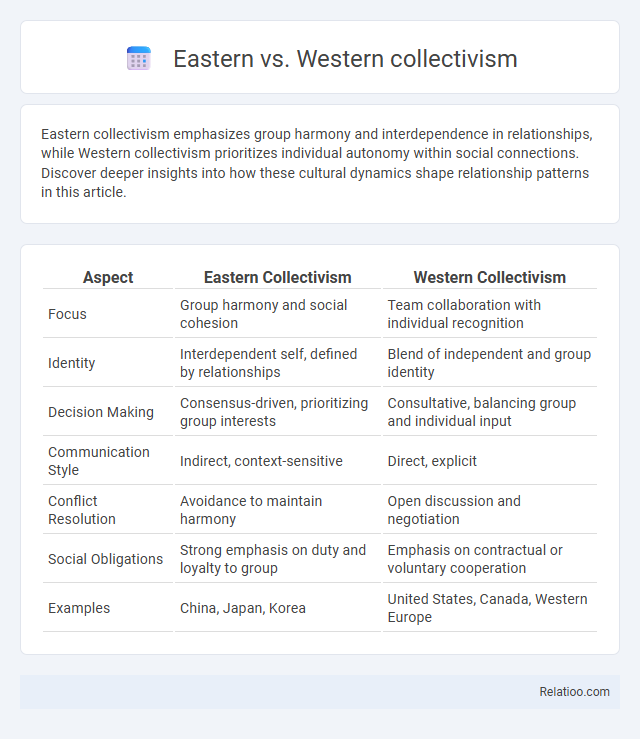Eastern collectivism emphasizes group harmony and interdependence in relationships, while Western collectivism prioritizes individual autonomy within social connections. Discover deeper insights into how these cultural dynamics shape relationship patterns in this article.
Table of Comparison
| Aspect | Eastern Collectivism | Western Collectivism |
|---|---|---|
| Focus | Group harmony and social cohesion | Team collaboration with individual recognition |
| Identity | Interdependent self, defined by relationships | Blend of independent and group identity |
| Decision Making | Consensus-driven, prioritizing group interests | Consultative, balancing group and individual input |
| Communication Style | Indirect, context-sensitive | Direct, explicit |
| Conflict Resolution | Avoidance to maintain harmony | Open discussion and negotiation |
| Social Obligations | Strong emphasis on duty and loyalty to group | Emphasis on contractual or voluntary cooperation |
| Examples | China, Japan, Korea | United States, Canada, Western Europe |
Understanding Collectivism: Eastern vs Western Perspectives
Eastern collectivism emphasizes interdependence, social harmony, and prioritizing family obligations, where individual desires are often subordinated to group needs. Western collectivism, although less prevalent, tends to balance personal goals with group affiliations, valuing autonomy alongside social responsibility. Understanding these cultural dimensions reveals how family obligations shape social behavior differently across Eastern and Western societies, influencing communication, decision-making, and social support systems.
Historical Roots of Collectivism in East and West
Eastern collectivism traces its roots to Confucian philosophy, emphasizing familial hierarchy, social harmony, and group interdependence, deeply embedding family obligations in social conduct. Western collectivism emerges from communal living traditions and early Christian teachings promoting societal welfare and shared responsibilities beyond the nuclear family. Historical contexts reveal Eastern collectivism prioritizes extended family loyalty, while Western collectivism centers more on civic duty and cooperation within broader community frameworks.
Core Values: Community vs Individual within Collectivist Cultures
Eastern collectivism emphasizes community cohesion and interdependence, prioritizing family obligation as a core value that reinforces social harmony and collective well-being. In contrast, Western collectivism, while valuing group identity, often balances community responsibilities with individual autonomy, reflecting a nuanced approach to family obligation. The core values in Eastern collectivist cultures underscore collective goals and shared responsibilities, whereas Western collectivist settings navigate the tension between individual rights and community support.
Family and Social Structure: Contrasting Approaches
Eastern collectivism emphasizes interdependent family and social structures where your role and obligations are deeply tied to group harmony and filial piety. Western collectivism often balances individualism with social responsibility, highlighting personal choice within family obligations and community engagement. These contrasting approaches shape how family dynamics and societal expectations influence decision-making and support systems across cultures.
Authority and Hierarchy: East Asian and Western Models
Eastern collectivism emphasizes authority and hierarchy within family obligations, maintaining respect for elders and prioritizing group harmony over individual desires. Western models, by contrast, value individual autonomy and challenge traditional authority, fostering more egalitarian family dynamics. Your understanding of these cultural frameworks can enhance cross-cultural communication and relationships.
Education Systems: Collective Goals versus Personal Achievement
Eastern education systems emphasize collective goals, fostering group harmony and prioritizing family obligation, where students often strive for academic excellence to honor familial expectations. Western education systems highlight personal achievement and individualism, encouraging students to pursue unique talents and autonomous success beyond familial duties. This divergence shapes motivational frameworks, with Eastern students motivated by social cohesion and respect, while Western students focus on self-fulfillment and personal growth.
Decision-Making: Consensus vs Independence
Eastern collectivism emphasizes decision-making through consensus, prioritizing family harmony and group welfare, whereas Western collectivism values individual autonomy and independent choices within the family context. Your decision-making process in Eastern cultures often involves consulting extended family members to uphold collective obligations, while Western families encourage personal responsibility and self-expression when making decisions. Understanding these dynamics can help you navigate family expectations while balancing personal preferences effectively.
Workplace Dynamics: Team Orientation in East and West
Eastern collectivism emphasizes harmonious teamwork and group consensus, fostering strong interpersonal bonds and prioritizing family obligation as a key motivator in workplace dynamics. Western collectivism also values team orientation but often balances individual achievement with group goals, leading to more flexible roles and less direct influence of family obligations. These cultural differences impact communication styles, decision-making processes, and conflict resolution in multinational teams, shaping distinct workplace environments across East and West.
Collectivism in Religion and Spirituality
Eastern collectivism emphasizes interdependence and communal harmony in religious and spiritual practices, often integrating family obligation as a core value to maintain social cohesion. Western collectivism in spirituality tends to focus on communal support and shared beliefs within religious groups, but places greater emphasis on individual agency within the collective. Your understanding of these differences can enhance cross-cultural sensitivity in spiritual or religious contexts.
Modern Challenges: Globalization’s Impact on Collectivist Traditions
Globalization has intensified cultural exchanges, prompting Eastern collectivist societies to reexamine traditional family obligations amidst modern individualism trends. Western collectivism, though less pronounced, faces similar pressures as diverse populations integrate, challenging established norms of group loyalty and familial duty. The convergence of global values forces a renegotiation of collectivist principles to accommodate economic mobility, digital communication, and changing social expectations.

Infographic: Eastern vs Western collectivism
 relatioo.com
relatioo.com